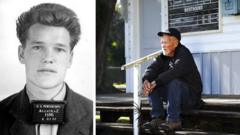Charlie Hopkins, at 93, claims to be the last surviving inmate of Alcatraz, a notorious American prison situated on an isolated island in San Francisco Bay. Reflecting on his three years of incarceration there from 1955, Hopkins brings a unique perspective amid recent claims by former President Donald Trump of reopening Alcatraz as a federal prison.
Hopkins, who served a 17-year sentence for kidnapping and robbery, reminisced about the eerie quiet of his time on Alcatraz. "It was a lonely sound," he recalled, reminiscent of the melancholic tones in Hank Williams' music. Having recently moved back to Florida following his release in 1963, Hopkins was informed by San Francisco National Archives that he is likely the last living ex-inmate of the infamous facility.
During his time incarcerated, he interacted with notorious figures and devised plans that, although unsuccessful, showcased the prison's palpable tension. The high-security prison, operational until its closure in 1963, housed some of America’s most infamous criminals, including Al Capone and Robert Stroud, known as the "Birdman of Alcatraz."
Hopkins' memories paint a stark picture of life on the island — a place devoid of comforts, with limited distractions. Once transferred from an Atlanta facility, he described Alcatraz as clean yet sad, filled with a sense of desolation. Most days were spent in solitary confinement; he often found himself against security measures after attempts to aid escapes.
With Alcatraz converting into a museum and a tourist attraction, Trump's recent proposal to reopen it for criminal rehabilitation faces skepticism. Experts point out the need for extensive repairs, claiming the costs to refurbish the island would be astronomical. Echoing these sentiments, Hopkins remarked, "It would be so expensive," highlighting the challenges of modernizing the facility, which has now become decrepit and largely uninhabitable.
Though an avid supporter of Trump, Hopkins is skeptical of the proposal's seriousness. "He doesn't really want to open that place," he asserts, suggesting that Trump's remarks serve more as political rhetoric aimed at portraying a strong stance against crime, rather than an actionable policy.
Reflecting on his own transformative journey post-incarceration, Hopkins worked at various jobs after release. He eventually authored a memoir detailing his experiences, including the personal struggles he faced during his criminal days. Looking back, he acknowledges the troubles he caused and recognizes the significance of his previous life choices.
As America's dialogue on crime and punishment evolves, Hopkins' insights offer a poignant reminder of the complexities surrounding incarceration, rehabilitation, and the historical significance of Alcatraz in the narrative of American justice.


















